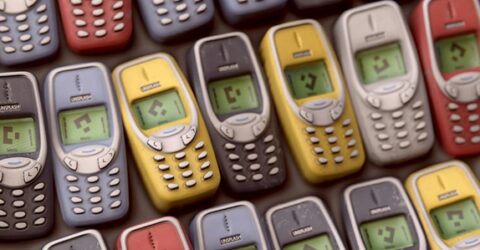How dumbphones could reset our relationship with the internet
The internet was once a computer-only service. Thanks to dumbphones, it might be again.

Back in the 1990s, going online was an activity equivalent to playing a computer game or watching a DVD.
You had to turn on a computer, connect it to the World Wide Web and then complete whatever you wanted to do – ideally in one sitting, to free up the landline again.
Today, the internet is ubiquitous, thanks to smartphones.
We check our phones a hundred times a day (or more) for instant news updates, Google fact-checks, push email notifications and social media scrolling.
Unfortunately, familiarity has turned to contempt, and the internet has inflicted tremendous damage on society and individuals alike.
Symptoms include diminished attention spans, soaring levels of anxiety and depression, intolerance of opposing viewpoints, disrupted sleep patterns and ADHD-like symptoms.
The effects on children are even more profound, physically rewiring developing brains.
Children face an abundance of unwelcome threats through smartphone use – bullying, doomscrolling, FOMO, malign online influences (and influencers), sextortion, scams, addiction…
It’s perhaps unsurprising that growing numbers of people are rebelling by purchasing mobile phones which hark back to the 1990s in their lack of apps and connectivity.
These dumbphones currently hold less than ten per cent of the domestic smartphone market, with many manufacturers shunning them due to minimal profit margins.
Yet they might represent a vital tool in the battle to achieve better mental health, both personally and societally.
Dumb and dumber
The concept of a dumbphone might seem…well, rather silly. However, it actually makes perfect sense.
So much of the information we’re exposed to nowadays is superfluous, advertising-driven or intentionally distracting.
Dumbphones strip out all this background noise, focusing on the core services of a mobile telephone rather than encouraging us to endlessly scroll, swipe and stare.
They handle phone calls and SMS messages, alarm clocks and music playing – and little else.
You won’t find gaming GPUs or 4K screens on these devices, let alone undeletable social media bloatware.
Dumbphones encapsulate digital minimalism – returning us to a time when computer monitors served as our internet portal, rather than tiny phone screens.
If you’re appy and you know it
Dumbphones aren’t widely marketed, though you will find hardware on sale at Argos and Amazon.
Manufacturers include Nokia and Doro, with the former’s 3310 and 8210 handsets harking back to a simpler (and happier) period of human existence.
Specialist manufacturers are emerging, including the crowdfunded BoringPhone, the iPhone-alike Wisephone II and the British-designed Punkt MP02.
As well as driving internet use back to computers and tablets, many dumbphones provide a month’s worth of battery standby, dual SIM slots and indestructible construction.
You don’t have to sacrifice every aspect of mobile phone usage, either. Standard features on some models include Bluetooth, in-built cameras, IP68 protection and 4G network coverage.
There are also options if your current handset is under contract, or if there are certain tools you couldn’t live without, such as parking apps or work-related productivity suites.
Android users can install the lowercase minimalist phone app, which strips back user interfaces and available software to the bare minimum, regardless of device specifications.
If your friends refuse to leave WhatsApp, or you can’t do your job without LinkedIn, you can retain these apps (and access to the Google Play Store) while jettisoning everything else.
It’s not about leaving the internet
It’s worth reiterating that dumbphones aren’t intended to wean people off the internet – simply to minimise their obsessive use of it at the dinner table, on the bus and at school/work.
You’ll still need a broadband deal, though it might not be taxed quite as intensively if it has fewer connected devices.
Most households have a desktop or laptop computer and/or a tablet device, suitable for social media and streaming, online shopping, gaming and productivity tools.
Dumbphones reduce the temptation to vacuously scroll through algorithm-selected fluff and unnecessary background noise. If you still feel compelled to goggle at TikTok, you can do so elsewhere.
As the tsunami of post-pandemic mental health issues continues to build, dumbphones represent a significant turning point in our battle against the always-on digital world.






